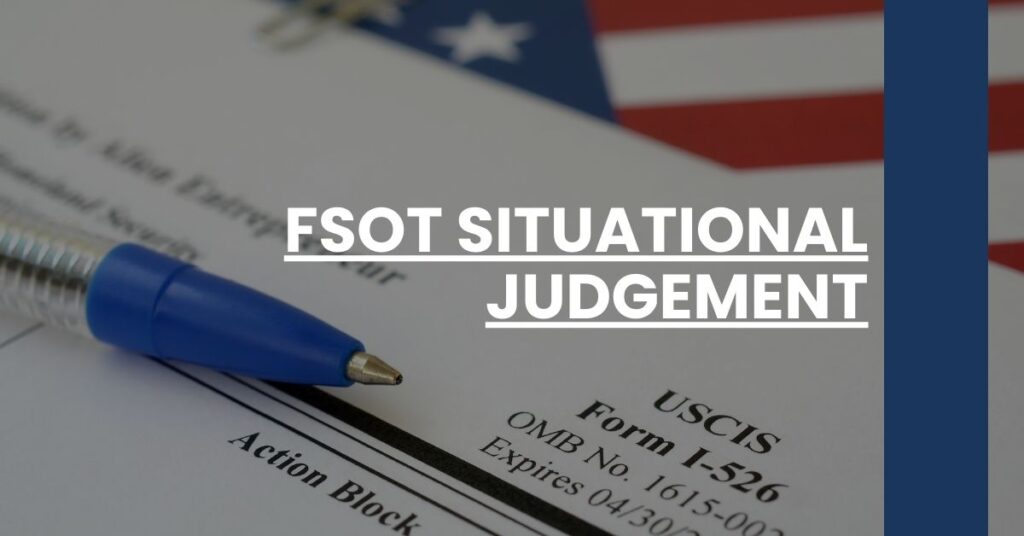FSOT situational judgement is pivotal for aspiring diplomats looking to excel in the Foreign Service.
- Mastering FSOT Situational Judgement: Learn strategies to tackle this critical exam section effectively.
- Situational Scenarios & Responses: Understand the types of questions you’ll encounter and how to respond appropriately.
- Preparation & Practice: Discover resources and practice exams to enhance your situational judgement skills.
Achieve success in the FSOT situational judgement section.
- Understanding the FSOT’s Situational Judgement Test
- The Importance of Situational Judgement for Diplomats
- Format and Structure of the Situational Judgement Section
- Preparation Strategies for Situational Judgement Success
- Common Challenges and How to Overcome Them
- Practice Makes Perfect: Utilizing Mock Exams
- Analyzing Sample Questions and Responses
- Evaluating Your Results
- Conclusion: Next Steps After Mastering Situational Judgement
Understanding the FSOT’s Situational Judgement Test
What Exactly Is the Situational Judgement Section?
When you embark on the quest to become a Foreign Service Officer, you’ll encounter the FSOT situational judgement section. This tailored set of challenges assesses your ability to navigate complex social situations, which are an everyday part of diplomacy. Imagine facing dilemmas where your decision affects not just individuals but potentially nations – this is what the test prepares you for.
Key Competencies Assessed
This section probes deep into your decision-making toolkit, looking for skills like critical thinking, adaptability, and problem-solving prowess. The idea is to place you in true-to-life scenarios and witness how you prioritize actions, respond to conflict, and demonstrate interpersonal skills crucial for a diplomat.
How Does It Reflect Real Foreign Service Work?
Each question is a close simulation of situations you’re likely to encounter in the field. So, think of this test as your virtual on-the-job challenge, where your responses could pave the path to global relations.
The Importance of Situational Judgement for Diplomats
Diplomacy in Action
Your ability to exercise sound judgement is not just beneficial but indispensable. Diplomats often work in high-stakes environments where a nuanced understanding of situational dynamics can lead to successful negotiations and, ultimately, peace and partnerships across borders.
The Ripple Effect
Decisions in the Foreign Service have profound consequences. In this light, the FSOT situational judgement section doesn’t just gauge your suitability for the role but also acts as a guardian of diplomatic integrity, ensuring that only those with the right judgement capabilities step forward.
Format and Structure of the Situational Judgement Section
Breaking Down the Basics
The situational judgement test might sound daunting, but knowing its structure can demystify it for you. You’re presented with 28 scenarios, and you have 42 precious minutes to determine both the most and the least effective courses of action for each.
- Quantity of Content: 28 scenarios
- Allocated Time: 42 minutes
- Type of Questions: Judgement-based decisions
A Closer Look at the Question Types
Each scenario is intricately designed to reflect potential diplomatic scenarios. Whether it’s resolving a conflict in the embassy or responding to a crisis abroad, the test calls upon your judgement as though you’re already in the field.
Preparation Strategies for Situational Judgement Success
Understand the Root of the Test
To ace this section, start by deeply comprehending the diplomat’s role. You need to embody the mindset of a Foreign Service Officer, which will guide your instincts and responses.
- Study Diplomatic Scenarios: Familiarize yourself with common situations faced by diplomats.
- Practice Ethical Decision Making: It’s not just what you do, but how ethically you solve issues that counts.
Leverage the Right Resources
Fortify your prep with the right arsenal of study materials. Utilize resources such as the Department of State’s official practice tests, which are specifically created to mirror the scenarios you’ll encounter in the FSOT situational judgement section.
- Use Mock Exams: Rehearsing with simulations builds confidence and speeds up your decision-making under timed conditions.
- Incorporate Feedback: After each practice scenario, critically analyze your choices and consider alternative responses.
Cultivate Your Diplomatic Quotient
To truly shine in the situational judgement test, develop an instinct for diplomacy.
- Critical Thinking: Enhance your ability to analyze situations from multiple perspectives.
- Communication Skills: Practice articulating complex ideas clearly and concisely.
By diving into these strategies, you bolster your preparations for the FSOT situational judgement section and edge closer to embodying the acumen of a seasoned Foreign Service Officer.
Common Challenges and How to Overcome Them
Tackling the FSOT situational judgement section can be intimidating even for the most prepared candidates. By understanding common hurdles, you can strategically devise a plan to leap over them with grace.
Facing the Unfamiliar
It’s not uncommon to feel out of your depth with unfamiliar scenarios.
- Broaden Your Knowledge Base: Dive into resources like FSOT study guides to familiarize yourself with a diverse range of diplomatic situations.
- Expand Your Worldview: Engage with current global issues to develop a broader understanding of international relations and affairs.
Dealing with Time Pressure
The clock can be a formidable foe during the test, but effective time management can be cultivated.
- Timed Practice Sessions: Use practice tests to get comfortable with the pace you’ll need to maintain.
- Prioritize Questions: Start with scenarios you find easier to handle and circle back to the tougher ones.
Overthinking Your Responses
Analysis paralysis can hinder your decision-making process.
- Trust Your Instincts: Remember, your first instinct may often lead you to a more natural and diplomatic solution.
- Avoid Second-Guessing: Make a choice confidently, and only revisit it if you have ample time left.
Practice Makes Perfect: Utilizing Mock Exams
Practicing with mock exams is a potent strategy that offers foresight into your FSOT situational judgement capabilities.
Simulating the Test Environment
Recreating the test conditions at home can sharpen your cognitive and decision-making faculties.
- Seek Quality Mock Exams: Websites such as FSO Compass offer practice tests that mirror the structure and content of the FSOT.
- Mimic Real Testing Conditions: Try to simulate the testing conditions as closely as possible, including timing and a quiet environment.
Evaluating Performance
Taking stock of your performance after mock exams can propel your progress.
- Identify Patterns: Look for recurring mistakes that may indicate areas needing improvement.
- Chart Your Improvement: Keep a log of your scores to track your progress over time.
Analyzing Sample Questions and Responses
Deductive reasoning and the ability to evaluate alternatives are at the core of the FSOT situational judgement section. Let’s see how this plays out in an actual context.
Interpretation of Sample Scenarios
Understanding the nuances of a diplomatic scenario requires focus and a strategic mindset.
- Dissect the Situation: Break down each scenario into its basic components to better understand the challenges presented.
- Consider Possible Outcomes: Weigh the potential consequences of each option.
Crafting Your Response
Once you’ve analyzed a scenario, crafting your response is the next step.
- Articulate With Diplomacy: Every choice should be tempered with the thoughtfulness and consideration expected of a Foreign Service Officer.
- Balance Decisiveness With Caution: Be firm in your decisions but mindful of their impact.
Evaluating Your Results
How you interpret and learn from your test scores can greatly enhance your preparation for the situational judgement section.
Understanding the Scoring System
The FSOT situational judgement test uses a comparative scoring system.
- Normalize Your Score: Recognize that your score is evaluated against those of your peers, as described by Pearson VUE.
- Analyze Subscores: Look beyond the total score to understand how you performed in different areas of the test.
Leveraging Feedback
The insights gained from your scores can direct your study efforts more effectively.
- Target Weaknesses: Focus on scenarios where you scored lower to improve your overall judgement skills.
- Consult with Mentors: Seek out advice from current FSOs or trusted advisors who can offer guidance.
Conclusion: Next Steps After Mastering Situational Judgement
Mastering the FSOT situational judgement test is an ongoing journey of refinement and growth.
- Continue Expanding Your Knowledge: Stay informed on global events and Foreign Service Officer responsibilities.
- Engage in Continuous Practice: Regularly revisit practice questions to keep your skills sharp and judgment keen.
With dedicated preparation and a focused mindset, you are well on your way to demonstrating the situational judgement prowess of an adept Foreign Service candidate.
Ace the FSOT situational judgement section with expert strategies for mastering diplomatic scenarios and enhancing critical decision-making skills.

